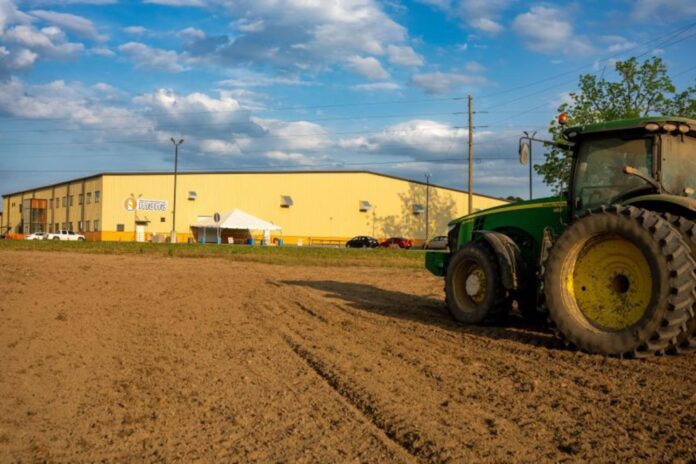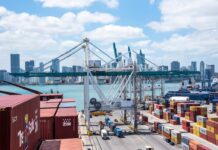
Thousands of workers at the U.S. Agency for International Development, or USAID, are being furloughed. This comes after a federal judge temporarily blocked a plan for employee “buyouts.”
It’s part of the Trump administration’s plans to strip down the agency, which was established by President John F. Kennedy in 1961 amid unprecedented efforts to cut the federal budget.
This week, USAID’s staff was cut from more than 8,000 direct hires and contractors to fewer than 300 employees, the Associated Press reported, with President Trump writing on social media Friday, “CLOSE IT DOWN.”
This move came after Trump associate and Department of Government Efficiency head Elon Musk called USAID a “criminal organization” in a Feb. 2 post on his X platform, adding “time for it to die.”
The dismantling of USAID could have negative impacts on local economies in South Georgia, where peanut products are created to send overseas to severely malnourished children.
 Mark Moore is cofounder and CEO of Mana, a Fitzgerald, Ga., nonprofit that makes a children’s survival mixture from milk and peanuts known as an RUTF — or ready-to-use therapeutic food.
Mark Moore is cofounder and CEO of Mana, a Fitzgerald, Ga., nonprofit that makes a children’s survival mixture from milk and peanuts known as an RUTF — or ready-to-use therapeutic food.
Mana manufactures enough packets of the vitamin-rich paste to feed approximately 2 million children per year through programs by USAID, UNICEF, the World Food Programme, Samaritan’s Purse, World Vision and others.
But Mana received a stop work order from USAID about a week ago.
Confusion set in nationwide as Musk’s “DOGE” group began shutting down websites and agency functions. Secretary of State Marco Rubio said there would be waivers for emergency food aid as part of the Food for Peace Title II Act under the Farm Bill, implemented by USAID’s Bureau for Humanitarian Assistance, but recipients were uncertain.
Moore said his $80 million budget for this year includes a variety of contracts for the RTUF but is largely subsidized by USAID. A Feed the Future Innovation Lab for Peanut Research through the University of Georgia, which aimed to help farmers in developing countries grow and profit from healthy peanut crops by learning from producers in Georgia, is also a USAID program.
“We were nervous there for a week trying to decide, ‘Is USAID going to come back? Are they going to honor contracts?’ — things like that,” Moore said. “Yesterday at 3:30 p.m., we got an email from our contracting officer saying, ‘You can start working on these projects.’”
Even if Moore and his 130 employees who make and pack the Mana product for shipping abroad from the Port of Savannah are allowed to continue producing for now, he is concerned about the logistics facing an understaffed USAID supply chain.
“[There are] just too many moving parts at USAID for such a drastic cutback to not have some effect, Moore said. “I can’t say specifically what it will be.”

(Credit: Mana)
Fitzgerald has a population of around 9,000 people. Moore reckons Mana is one of the top employers in the town.
“It’s a great town, but not a big town, and peanuts are all around us,” he said. “So if you walk out of our factory door, the plot across the street rotates between cotton and peanuts. And it was peanuts this year.“
According to the USDA, Georgia produces more peanuts than all other states combined. The Georgia Peanut Commission’s 2023 report noted that Georgia’s 4000 peanut farmers harvested 778,000 acres of peanuts in 77 counties, yielding a $2.2 billion industry. The crop’s dominance is one of the reasons Gov. Brian Kemp celebrated Mana’s expansion in May 2022.
“It’s great to see the amazing work done by hardworking Georgians in Ben Hill County,” Kemp said in the statement. “We are excited to watch MANA Nutrition serve communities in need worldwide with products from our state’s No. 1 agriculture industry. We have been laser-focused on creating impactful opportunities across the state, and jobs like these will be good for the local community for years to come.”
Jason Dunn, Director of the Fitzgerald-Ben Hill Development Authority, also praised Mana’s and local farmers’ “combination of Georgia Grown peanuts and the state-of-the-art production … expanding the reach of Georgia’s ag legacy.”
Last July, Mana broke ground on the refurbishment of a 320,000 square foot facility in Pooler, Ga., a few miles from the Port of Savannah, calling it “one of the largest dedicated humanitarian warehouses in the United States of America.”
Georgia Ports President and CEO Griff Lynch said he was “honored to handle [Mana’s] vital product line through our port.”
Samantha Power, the former USAID Administrator with strong Georgia ties who served until Jan. 20, 2025, when Jason Gray was appointed to the role by Trump, visited the Fitzgerald location in May 2024.
Power attended Atlanta’s Lakeside High School as a child and was later lauded in her role as U.S. Ambassador to the United Nations under President Obama as “a powerful representative of the United States” by the late Republican senator from Georgia, Johnny Isakson.
In a Feb. 5 interview on MSNBC, Power said the current administration’s targeting of USAID relied on the public not knowing what U.S. impacts it had.
“The calculated bet here was that this was for foreigners,” she said of perceptions about the organization she led for four years. “The people who are trying to destroy the agency aren’t people who know anything about what USAID does, they don’t know we deliver magical peanut paste made in rural Georgia that Georgia farmers care passionately about being part of … they take pride in bringing those kids, basically, back to life.”

(Credit: Facebook)
As for Moore, he said he hopes Americans understand what a small fraction of taxpayer dollars actually go to fund USAID as part of the overall U.S. budget.
“Our giving to USAID as a government entity is [equivalent to] $100 out of $50,000; it’s two-tenths of 1%,” he explained as an analogy. “So is it acceptable to waste any of it? No. Should we misspend it? No. Should we look at it and examine it? Yes. But if you eliminate it, is it the thing that’s going to change your financial situation? And what is the impact, then, of eliminating that $100 spend in your $50,000 budget? And it’s massive.”
Moore said that the future of USAID may be blurry but the livelihood of his nonprofit organization’s employees and the need for Mana’s lifesaving product around the world are clear.
“We’re not discouraged yet,” he said. “We’re going to keep going, and finding a way forward is too important to just sit around and sort of indulge in feeling sorry for ourselves. We’re going to get it done.”
This article appearson Now Habersham in partnership with GPB News







